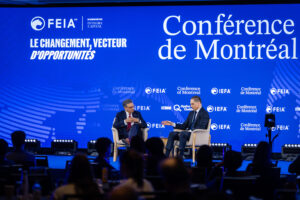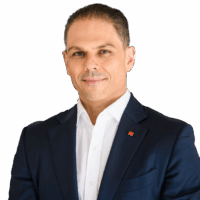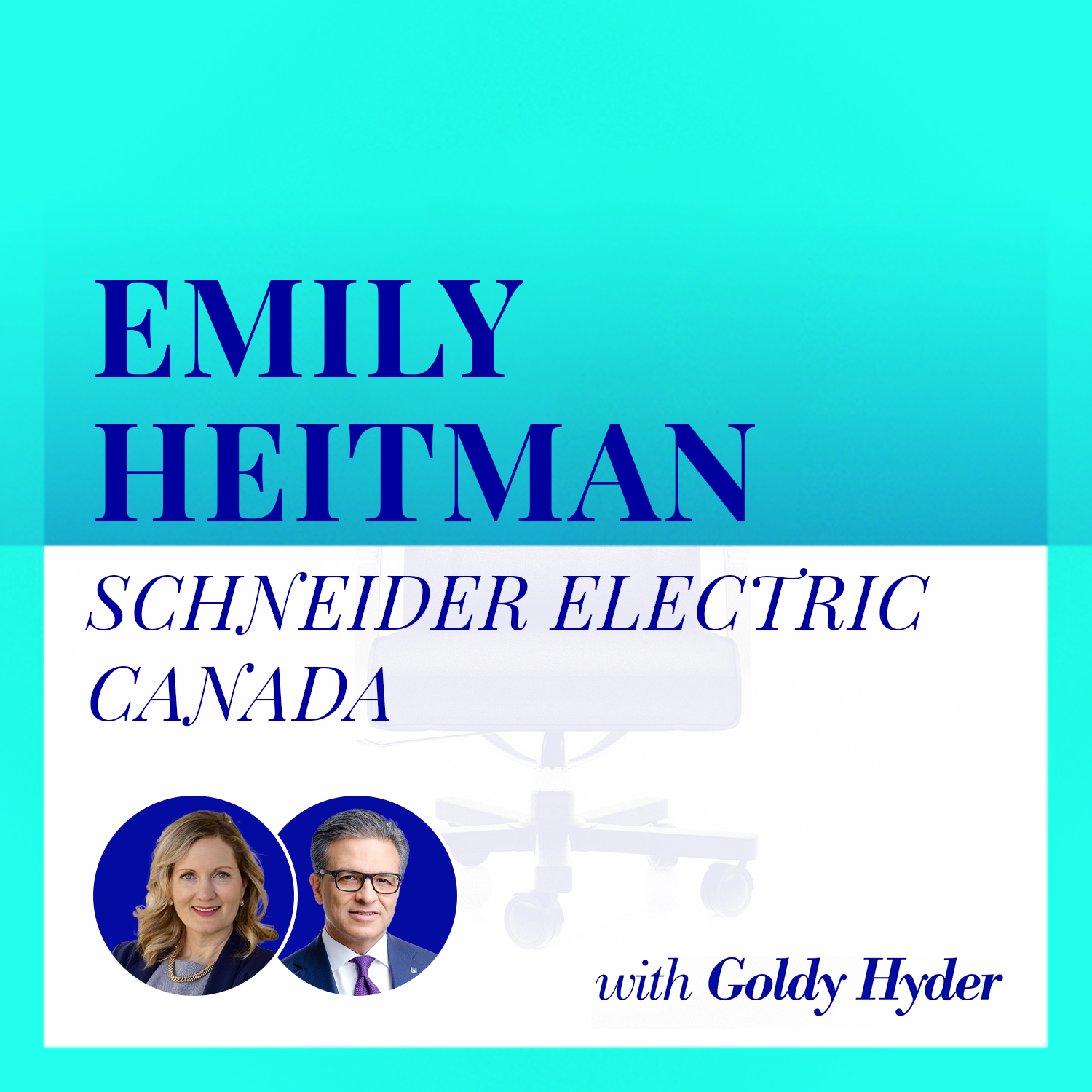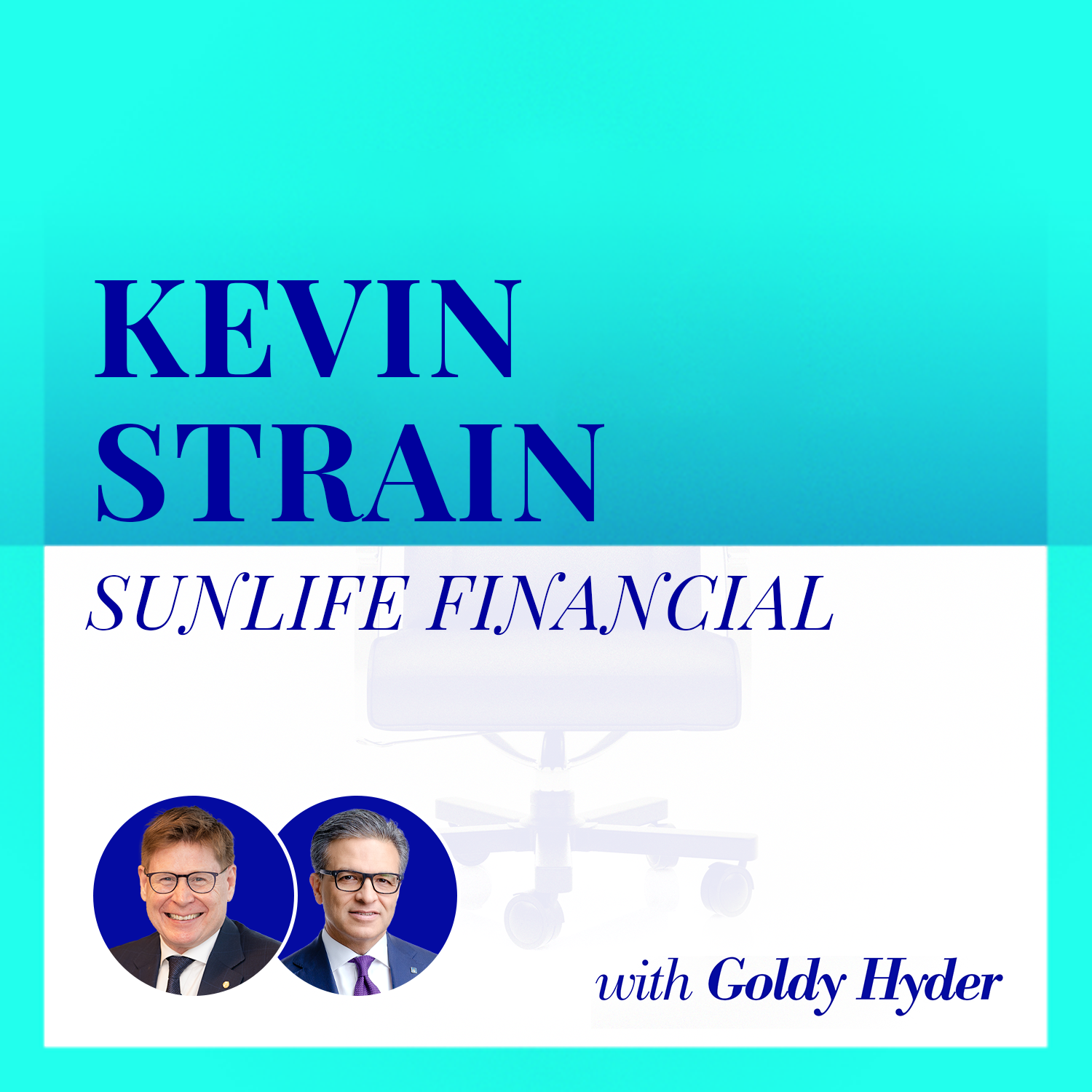Laurent Ferreira is blunt when he assesses the state of Canada’s economic trouble.
“The status of our economy is red,” he said in a June 9 conversation with Goldy Hyder at the Conférence de Montréal.
The president and CEO of National Bank of Canada stressed the urgency for Canada to strengthen its economy in light of geopolitical uncertainty. But he’s optimistic the country will take action, saying now is the time to “get projects built across the country, get to the bottom of what are the causes of our economic performance, and move forward.”

Ferreira sees a major role for Canadian energy in Canada’s future. The Quebec-based bank recently acquired Alberta-based Canadian Western Bank, expanding the bank’s footprint into more markets across the country. He says nation-building projects, including energy, will keep the federation strong. And to land those projects, there’s an overriding need to reduce regulations.
“I think that the biggest impediment to energy transition is regulation. It’s not Alberta. It’s regulation. That’s the real problem.”
Listen to the full conversation on the Speaking of Business podcast.
Cold open:
Laurent Ferreira (06:14):
time is our enemy. We have to act and geopolitical risk, economic warfare is on the rise. We’re not going to be spared. The status of our economy is red, and we need a wartime cabinet approach to solving these issues right now.
Goldy Hyder:
Welcome to Speaking of Business, conversations with innovators, entrepreneurs and leaders. I’m Goldy Hyder, President and CEO of the Business Council of Canada. I don’t need to tell you that we are living in tumultuous times. Instability around the world has led to uncertainty here in Canada, and if there’s anything businesses don’t like, it’s uncertainty. How do you plan ahead for years in the future when you’re not even sure what could happen next week? It’s a question I asked Laurent Ferreira in early June. He’s the president and CEO of National Bank of Canada, overseeing the management of hundreds of billions of dollars in assets. I spoke with Laurent in front of an audience at the Conférence de Montréal, hosted by the International Economic Forum of the Americas. Here’s our conversation.
Thank you for doing this. Banks are of course, in many ways in the management of risk, and we are experiencing incredibly uncertain times and so much volatility. How are you going about running the bank at a time like this?
Laurent Ferreira:
Well, it’s certainly made it more complicated, but I’ve been the CEO of National Bank now, I’m in my fourth year. And if I look back, at all the economics updates that we’ve given through our analyst calls or economic events with our clients, I have yet to say that the path is clear. We’ve been since 2020 basically in crisis management mode. These risks, they keep on rising and I think is your strategy okay? Are you executing on your strategy? Those are the most important things that you need to remind yourself.
One of the things that I’m a big believer in is when you get through crisis, you have to have a very strong team. So to me, people and culture are the most important thing to get through crisis. There’s a shock. You absorb it. You learn from it. You become stronger. We’ve learned through the global financial crisis of 2008, COVID, the inflation that followed, the current trade war. I think people and culture will make you resilient through time. Of course, you need balance sheet, you need liquidity, you need capital. All those things are very important for banks and to support your clients, but in the long run, strong risk management culture gets you through.
Goldy Hyder:
Is it tough? Obviously publicly traded company, quarterly reporting, you want to have a long-term strategy. You’re looking out. How do you navigate that pressure from short-term to long-term, especially with all of the unpredictability?
Laurent Ferreira:
Sometimes you have tactical adjustments to make, but we’re in the middle of an integration. We just acquired Canadian Western Bank and we closed on this year.
Goldy Hyder:
Congratulations on this.
Laurent Ferreira:
Thank you. But it’s a great time to double down on execution. There’s a crisis, okay, what do we do? What do we adjust? We talk to our clients, figure this out. Our liquidity is good. Capital is good. Fine. What about our strategy? Yes, of course we’re still on. This is a good time to actually go faster and move faster. You do adjust certain things. You have to spend a lot more time with your clients in a situation where there’s-
Goldy Hyder:
What are they telling you?
Laurent Ferreira:
Well, a lot of them are worried right now. We all got shocked with Trump. Everyone thought … I was shocked. Trump comes in, you think he’s going to be pro business. You think he’s going to deregulate tax first? And now he comes with I think a jolt to the market. So I’m a little bit surprised. So there’s stress in the system. There’s anxiety for sure, but they’re still very resilient. I look at some of the discussions that we have with our clients. Some clients come up and say, “I don’t have debt on my balance sheet. I’m a buyer now.” It’s the kind of attitude that I’m hearing. Early on we heard that the whole Canada, U.S. thing, and so we need to do more here in Canada and I want to procure more in Canada. Show me the list of your clients. Let’s work together.
Goldy Hyder:
Well, speaking of working together, I mean the president has managed to do something that probably most Canadians have not been successful in doing, which is uniting our country, east to west, French to English, urban, rural.
Laurent Ferreira:
We might thank him one day. Thank him.
Goldy Hyder:
Yeah. I think we should thank him now. Actually, the fact that we’re having the conversations that we are, clearly, we have a new government, a new prime minister setting, very ambitious expectations for us as a country, but we are Canada, we’re not a corporation. We’re a confederation. We have provinces. We have courts. We have duties to consult. We have the Indigenous communities and many other challenges. Are you hopeful that just maybe at this time we can work as a team and get things done?
Laurent Ferreira:
I’m very hopeful and I’m very happy that we’re raising that bar really high. It’s time. This leadership that we are observing right now from Ottawa and bringing together the provinces at the table is extremely good for our country and it’s the leadership we need right now. Everything is in the execution. We all get that, but this is what we need to do right now. We have to set Trump and tariffs aside for a second, and go back to our economic performance hasn’t been stellar. Productivity, GDP per capita is lagging all of the G7, including the U.S. for several years now. So this is what we have to go back to. Get projects built across the country and get to the bottom of what are the causes of our economic performance and move forward.
Goldy Hyder:
One of the things that you had said is the biggest risk that Canada is actually not the tariffs, but it’s complacency. Can we change culture just like that?
Laurent Ferreira:
And the reason why I said that, my fear is we sit down with the U.S. and we renegotiate-
Goldy Hyder:
Figure it out.
Laurent Ferreira:
We figure it out with them. USMCA is being renegotiated. Everyone feels and we say, “Okay, the job is-
Goldy Hyder:
And now return you to regularly scheduled programming.
Laurent Ferreira:
Exactly. So that’s the biggest risk. Global risks are on the rise right now. We’re all happy with the current leadership that’s happening. A sense of urgency it feels like, but time is our enemy. We have to act and geopolitical risk, economic warfare is on the rise. We’re not going to be spared. The status of our economy is red, and we need a wartime cabinet approach to solving these issues right now.
Goldy Hyder:
Well, the old saying, don’t waste a good crisis. Not too long ago, in fact, just less than 60 days ago, you had suggested that the economy could slip into a recession in the second half of the year. Are you still feeling that way?
Laurent Ferreira:
Well, look, the numbers look good for the first quarter. A lot of it is front loading of trade-
Goldy Hyder:
Stocking up. You mean everybody?
Laurent Ferreira:
Is stocking up. Exactly.
Goldy Hyder:
Yeah.
Laurent Ferreira:
So exports to the U.S. Yeah. Of course, I’m concerned. If tariffs stay on and we don’t do anything about it and we can’t renegotiate anything anytime soon, it’s going to be a tougher second half for sure.
Goldy Hyder:
Now capital of course loves predictability, loves certainty. There not a lot of that going around, certainly in the United States and to some extent in the western society, but capital will find its way to other places if there’s an opportunity. Are you seeing that? Are you seeing a flow where more predictable markets are attractive?
Laurent Ferreira:
It’s still early days. I think you’re seeing a lot more restraint at this point in time. In the bank, we see movements. Typically, what do we see? We see demand deposits go up because people are parking their money. Momentum is still strong on business loans. M&A is on pause. Mortgages in general are okay, a bit of a slow down with the current environment, but it can’t last. So we have some momentum that’s still there. But you said it, capital and uncertainty, it doesn’t work. Until we get clarity, which that’s the big question mark. When are we going to get clarity? I don’t see yet where it goes. And it could take a long time.
We’ve talked a lot about, well, we’ve got to diversify our trade. So first of all, we have to create those new relationships. We have to create those new roots and those new deals. So it doesn’t happen overnight. We need to get along with the U.S. They are our biggest trading partner and they will remain our biggest trading partner, and I really, really hope that when we sit down and negotiate with them, it leads to economic stronger ties and security for both of our countries.
Goldy Hyder:
So the pushback to that that you would get from others is how could you go into a scenario where the author of the trade agreement is now violating their own trade agreement? What confidence can you have that the relationship with the United States can be restored to what it was. Geography is not going to change, but Canada can control her own controllables to some extent. So how do you reconcile? You’re with the G1, but you’ve got this country here that is in demand for almost everything that we have around the world and we’ve landlocked ourselves?
Laurent Ferreira:
Yeah. The one thing we have to remember is we can’t rely on the U.S. like we did in the past, but we need to get along with them and we need to work with them and we need to diversify trade. G7 is coming up and Carney has been extending invitations to world leaders. I think that’s good news. He wants to start those discussions as quickly as possible. So I think that’s good. Hopefully that what’s going on in the U.S. is a chapter and that we’re going to get over this chapter at some point in time, but we have to get along with them. We have to figure out what is it that they want and what is going to be a good deal.
Goldy Hyder:
Is it safe to say that certainly the behavior of the stock market at least seems to imply that they’ve baked in the current situation, but they do see that eventually things are going to stabilize?
Laurent Ferreira:
It feels like that a little bit. I mean, the bond market doesn’t believe that though.
Goldy Hyder:
No, that’s why said stock markets.
Laurent Ferreira:
So the stock market has recuperated. I mean, I’m a little surprised with the speed at which it’s recuperated and not National Bank. I’m actually very comfortable where we’re trading and where it’s going. But there is a sense of is there maybe complacency here? And I think there’s also an understanding in the market that a lot of the announcements and the tariff announcements are not baked in, are not done yet, and it’s a call for a negotiation. So maybe the market is seeing that as well. And yes, they’re all hoping for a good outcome.
Goldy Hyder:
So it’s hopeful? They’re not in denial entirely, but they’re hoping for a good outcome.
Laurent Ferreira:
Right.
Goldy Hyder:
Okay. Now, speaking of good outcomes, you just, I’m an Albertan and you’re a Quebecer, so this is a great storyline. You expanded. You expanded west and you’ve got a bank that you were very interested in for some time. Tell us about your decision to expand, to go into the west and how it’s going so far in these early days of the Canadian Western Bank.
Laurent Ferreira:
That’s fantastic. We’re so happy with our transaction. So this week will be exactly the one year anniversary of the announcement. We closed earlier this year, so it’s going really well. So you talk about Quebec and Alberta, maybe the story of National Bank 165 years and the bank was created by entrepreneurs for entrepreneurs. That’s really what National Bank is all about. We’ve been growing for the past 100 years plus and growing across the country. Our capital markets business over the past 30 years has serviced clients across the country, corporations, institutions, governments. Our wealth businesses, more than 40 per cent of our wealth businesses are already outside of Quebec and commercial banking has been growing as we’ve increased hiring.
This transaction, Canadian Western Bank comes in. Canadian Western Bank was founded in 1984 by two entrepreneurs from the city of Edmonton. So Dr. Charles Allard and Eugene Pechet. I was in Edmonton last week and met with Dr. Charles Allard’s daughter, Cathy Rosen. She was still a very large shareholder of CWB and now a very happy shareholder of National Bank. But CWB was created by two entrepreneurs in the province of Alberta for entrepreneurs in the region.
So this transaction, you look the east, the west, it’s geographically makes sense strategically, we get it. You’re expanding your footprint. The numbers make sense, you’re going to grow from there. But what’s really interesting about this is we share the same DNA. We understand entrepreneurs. We understand local markets. That’s the success of National Bank. That’s the success of CWB. And together we think we’re going to do a lot more.
Goldy Hyder:
There’s a lot made about the Alberta-Quebec relationship and in many ways there is a sense of common cause. I think both are working together to limit the federal government’s intervention in our provinces on many things. We are possibly seeing a moment where there’s a lot of coming together. You mentioned the gathering of Team Canada. I was in Saskatoon for the first ministers meeting and lots of expectations, lots of hype, lots of hope.
But as I mentioned earlier, this is Canada. We do get in our own way sometimes. One of the things that we’re looking at now is to build things and building things requires consensus and it requires support. Do you see us being able to actually build the infrastructure? You mentioned it’s a long run because it is a long run. Can we keep this going past whatever happens in the United States or do we run the risk of going back to North-South trade?
Laurent Ferreira:
Well, I hope not, but we need strong leadership from Ottawa and what we’ve seen so far I find it very encouraging. And bringing everyone at the table and saying, do we all agree with the issues together? And that we’re going to be much stronger together. And let’s decide what our prime minister calls the nation building agenda are, and Canada as an energy superpower. I’m very hopeful. This time around, I find it very, very exciting and refreshing what we’re hearing. Now, the results are the most important thing. So the outcome of all of these discussions are going to be important. What is going to keep our country, our federation strong? Well, it’s going to be successful execution of nation building, of energy superpower, defence spending. I think those are going to be very important.
Goldy Hyder:
What messages would you have to Albertans now, as you’ve heard, there’s this possibility that they’re exploring having a referendum. Do you understand the sentiments behind that? I know they’re not widely held, but they’re certainly held in Alberta as “it’s not working for us.”
Laurent Ferreira:
I certainly do understand. And in April we spent a full week in Alberta, Edmonton and Calgary, and we did our AGM there and I spent a lot of time with clients. I felt the frustration. And we were in a room like this and questions were asked of me and people would come up and say, “How do you think we feel when the vote is decided?” So I get it. We get it. So this is why strong leadership is going to be very important going forward. And what our prime minister has to get right is to sit with the premiers of every province and say, “We’re working on this together.”
I think we should adopt no more politics, no more. Let’s work on this together. We understand everyone gets it, the emergency, no one’s going to stop… If we have an agenda where everyone is saying, this is it, we’re doing it together. The current government has, and it’s rare, but I think they have the country, they have all the people behind them right now on this issue. Trump has scared everyone, geopolitics, economic warfare, everyone is there.
Goldy Hyder:
One of the issues that of course comes to the fore when you talk about Alberta is the issue of getting natural resources to market, but also reconciling with the climate agenda and the environment agenda. You co-chair a working group at the Business Council on that. How are you feeling about where we find ourselves now in our ability to do both, that this isn’t an or option, it’s an and solution.
Laurent Ferreira:
I agree. I agree with it is an and, and I do believe we can do both. And it’s not by shutting down our economy or parts of our economy that we’re going to have an impact on climate change. So we need to build infrastructure. We need to build renewable. We need to build conventional. I think that the biggest impediment to energy transition is regulation. It’s not Alberta. It’s regulation. That’s the real problem.
Goldy Hyder:
We certainly hear that from our members or any sector-
Laurent Ferreira:
100% regulations. Northland power based in Ontario. Where are they building? Poland, Baltics, not in Canada. Why? Because the regulation is that it doesn’t work and tax doesn’t work either. It’s a hard place to invest. So I do believe we can do it. We have the people, we have the resources, we have the technology. And I also do believe that we need to maybe related industry, we should invest in related industry like research and development and clean tech AI. Take for instance the forest fires. We should be maybe developing an expertise using satellite drones and everything else and working with countries that have similar issues like Australia for instance, be the best at developing ways to protect against forest fire.
Goldy Hyder:
Speaking of forest fires, the province that the G7 is being held in is in Alberta. Beautiful area, Kananaskis. Fortuitously, Prime Minister Carney has an opportunity to host the G7, has invited a number of other world leaders from Indonesia, to Australia, Mexico today just confirmed as well. If you were to give him any advice recognizing that Charlevoix took place and that didn’t go over very well with President Trump. And from that day on, I think there was a lightning rod that triggered him about Canada. How does he manage this G7 and come out of it stronger?
Laurent Ferreira:
Mark Carney is very diplomatic and I trust his judgment on everything. And you’re right. The concern about potential lightning rod after that is … I think the message and I think what the world needs to hear and understand is that Canada’s back. I think that that would be-
Goldy Hyder:
We heard that 10 years ago.
Laurent Ferreira:
I know, but this time it’ll be different. All the priorities that the Prime Minister and the Premiers talked about in Saskatoon last week, I think that should be really well communicated and say, “This is where we’re going as a country.” We want to be part of the global solution. I think bringing energy and products to world markets, being leaders in peace as well. I think that is a very powerful message. But I think that we need to show that we are now going to be, I think a country of influence at the table. And I think that is a good start to bringing back those relationships, forging stronger ties with the rest of the G7.
Goldy Hyder:
And one of the ways to of course do that is today’s significant announcement made by Prime Minister Carney in Toronto on NATO and NATO spending. Something again that I think business leaders have said, “Look, we gave our word, we should keep our word.” We don’t really have an industrial policy in Canada, but defence industrial base could be an opportunity. How do you see that working so that we’re not just buying things from the Americans, but we’re also making things?
Laurent Ferreira:
We need a strong industrial policy. We’re going to have to buy things from the Americans. But I’ve said that earlier this year. I do believe that we need a Buy Canada Act for defence procurement. I think we should be doing more. Now, the concern I do have is what do you need for that? You’re going to need power, so more energy and you’re going to need to unburden your manufacturing sector because that’s what it means. It’s going to be more manufacturing here in our country and starting up a business is not easy in Canada. So I think that those are going to be key.
So the industrial policy is going to be important. You’re going to have to do procurement in the United States and you have to talk about that deal. And maybe we could part of the negotiation and say, “Okay. There are certain things that we could do also in Canada for protecting North America.” So everything is linked. We need more energy. Right now, I’ve asked a question to Michael Sabia who runs Hydro-Québec said, if you have to increase the manufacturing sector in Quebec by 10, 15 per cent because we need to increase defence spending. Do you have the energy? No. So everything is linked.
Goldy Hyder:
What is the role of business leaders and everything that we’re talking about? Now, here you are on a Monday morning, we’re talking, but how do business leaders lean in at a time like this?
Laurent Ferreira:
We have to be more vocal. And that’s one thing I learned. I’ve been in the job fourth year, but feedback I’ve received and politicians, they say, “Well, please be vocal. It helps us.” So we have to be more vocal. It’s part of the responsibility. We’re the voice of our clients. So when I go out and say something, the risk management check is, “Okay. What would my clients say when they hear this?”
Goldy Hyder:
Well, how I go about my job representing you, by the way. “What would he want me to say?”
Laurent Ferreira:
That’s it.
Goldy Hyder:
Yeah. But are we doing enough of that?
Laurent Ferreira:
I think we’re doing more, but we need to do more, I think. And we need to work with our government. The past six months have been very encouraging. You’ve heard the Premier Legault and Ford and even Danielle Smith say, Saskatoon was great. We haven’t talked about the economy like this before. The reach out that I get from government now has gone up 10 X in the past 6 months versus the first 3 years.
Goldy Hyder:
A lot of the issues we’ve talked about from the United States, their economy and the markets and so forth. We didn’t touch on where you said regulations, taxes, all the things. But as you know, one of the things that’s top of mind for CEOs and beyond that in the C-suite is the issue of talent. How are you feeling about where we are, particularly given some of the challenges that we’ve now faced? On the question of immigration and foreign students and temporary foreign workers, we seem to have lost a generational consensus on this. How concerned are you in terms of how we get that back?
Laurent Ferreira:
We need targeted programs, skilled labour. Hydro-Québec needs 25,000 workers for their growth plan. So we need labour to be able to move freely in this country. So we need nationwide credentials that are equal between Ontario. It’s ridiculous between Quebec and Ontario. But you need an electrician in Northern Quebec and if there’s one in Sudbury, that person can’t come. So you have to get them to come from Montreal. So we need targeted programs for talent and we need accreditation to be accelerated as well. An electrician that comes into this country from Europe, it takes over a year for them to be ready for work.
Goldy Hyder:
All right. Mindful of the fact that we stand between this audience and their lunch. Let’s have a little fun just to wrap it up and lighten up the mood a little bit. Many are probably visiting. Tell me what’s your favorite part of Montreal?
Laurent Ferreira:
I guess the Bell Centre, hockey fan and love music as well. So Bell Centre.
Goldy Hyder:
Okay. Well, then I have to ask as an Albertan, who’s going to win the Stanley Cup this year?
Laurent Ferreira:
Oilers.
Goldy Hyder:
Good answer. Good answer. You spent some time in my home city of Calgary.
Laurent Ferreira:
Yes.
Goldy Hyder:
What do you like about Calgary?
Laurent Ferreira:
The Stampede.
Goldy Hyder:
The Stampede.
Laurent Ferreira:
I was there last year. I’m there in July.
Goldy Hyder:
We’ll see you there in a few weeks. That’s great. Fun fact. I learned that you were, first of all, you said you were not a serious teenager and that you grew up listening to Black Sabbath and Judas Priest. So what do you listen to now?
Laurent Ferreira:
Where did you hear that?
Goldy Hyder:
I got good sources. What do you listen to now?
Laurent Ferreira:
I listen to all music. I love concerts, live music. But I am a fan of very heavy music, and I was in Toronto. I saw Metallica last month. I’m actually going to see Slayer in Quebec City next week. So I do like extremely heavy music, but I like all music.
Goldy Hyder:
All right. Tell me how you relax.
Laurent Ferreira:
I like manual work. I like my cottage. I like chopping wood. I like the gym. And I like traveling with my family. That helps a lot.
Goldy Hyder:
And family is what it’s all about at the end of the day.
Laurent Ferreira:
Yes, it is.
Goldy Hyder:
All right. Well look, thank you for doing this with us today. Ladies and gentlemen, Laurent Ferreira.
Laurent Ferreira:
Thank you. Thank you for having us. Merci.
Goldy Hyder:
Laurent Ferreira is the President and CEO of National Bank of Canada. I spoke with him in early June in front of an audience at the Conference de Montreal. If you’ve missed any of our speaking of business conversations, you can catch up by subscribing to our podcast, search for Speaking of Business, wherever you get your podcasts, or check out our website where you’ll find photos and other content from our conversations.
Go to thebusinesscouncil.ca/podcasts and yes, it’s thebusinesscouncil.ca. Speaking of Business is a production of The Business Council of Canada. Our thanks this month to the International Economic Forum of the Americas. We couldn’t do the podcast though without Will Mcintyre and the team at Pop Up Podcasting in Ottawa. Until next time, I’m Goldy Hyder. Thanks for joining us.












